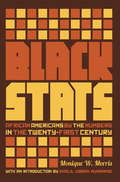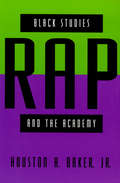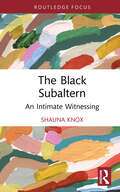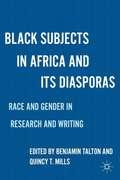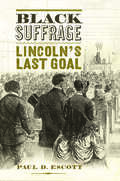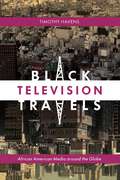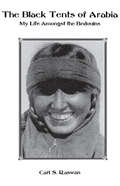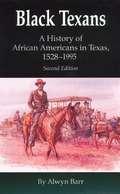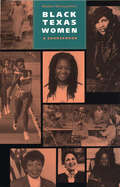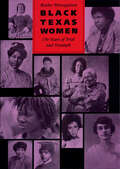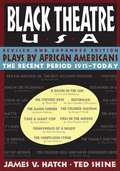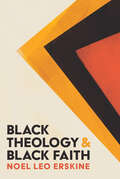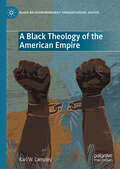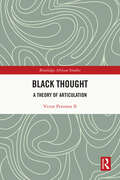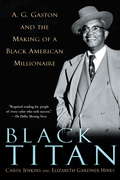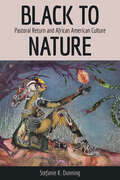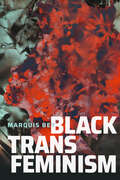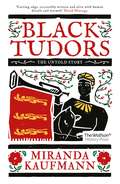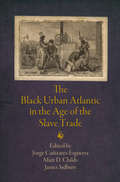- Table View
- List View
Black Star Over Japan: Rising Forces of Militarism (Routledge Library Editions: Japan)
by Albert AxelbankThe Japanese are the only people in the world who have experienced the horror of nuclear weapons with their own flesh. Atomic holocaust was followed by American occupation and the American-inspired, postwar Japanese ‘Peace Constitution’ which explicitly outlawed Japanese military forces and the use of war as an instrument of state policy. At the time of original publication the author argued that contemporary forces within Japan were combining to create a strong movement for revision of the constitution and for the acquisition of nuclear weapons by renewed and powerful military establishment. The American government, which had encouraged rearmament, was beginning to wonder about the world effect of an economically powerful rearmed Japan and was weighing the consequences of considering Japan its only major ally in East Asia. Albert Axelbank suggests that shifting international politics and the conservative momentum in Japan make revision of the constitution and the development of Japanese militarism and nuclear weapons almost inevitable.
Black Stats: African Americans by the Numbers in the Twenty-First Century
by Khalil Gibran Muhammad Monique W. MorrisBlack Stats-a comprehensive guide filled with contemporary facts and figures on African Americans-is an essential reference for anyone attempting to fathom the complex state of our nation. With fascinating and often surprising information on everything from incarceration rates, lending practices, and the arts to marriage, voting habits, and green jobs, the contextualized material in this book will better attune readers to telling trends while challenging commonly held, yet often misguided, perceptions. A compilation that at once highlights measures of incredible progress and enumerates the disparate impacts of social policies and practices, this book is a critical tool for advocates, educators, and policy makers. Black Stats offers indispensable information that is sure to enlighten discussions and provoke debates about the quality of Black life in the United States today-and help chart the path to a better future.There are less than a quarter-million Black public school teachers in the U.S.-representing just 7 percent of all teachers in public schools.Approximately half of the Black population in the United States lives in neighborhoods that have no White residents.In the five years before the Great Recession, the number of Black-owned businesses in the United States increased by 61 percent.A 2010 study found that 41 percent of Black youth feel that rap music videos should be more political.There are no Black owners or presidents of an NFL franchise team.78 percent of Black Americans live within 30 miles of a coal-fired power plant, compared with 56 percent of White Americans.
Black Student Teachers' Experiences of Racism in the White School: Strategies of Resilience and Survival (Palgrave Studies in Race, Inequality and Social Justice in Education)
by Veronica PokuThis book investigates the racism experienced by Black teacher trainee Post-graduate students whilst on teaching placements in South London primary schools. Using critical race theory as an epistemological lens, the book goes on to explore their experiences in school via testimonies around the gaslighting they were subjected to. Chapters delve into how these students work to fit themselves into the school’s white space at an emotional and psychological cost and addresses the questions these experiences raise for those in charge of PGCE courses and Initial Teacher Education.
Black Students, Middle Class Teachers
by Jawanza KunjufuA compelling look at the relationship between the majority of African American students and their teachers.
Black Studies, Rap, and the Academy (Black Literature and Culture)
by Houston A. Baker Jr.In this explosive book, Houston Baker takes stock of the current state of Black Studies in the university and outlines its responsibilities to the newest form of black urban expression—rap. A frank, polemical essay, Black Studies, Rap, and the Academy is an uninhibited defense of Black Studies and an extended commentary on the importance of rap. Written in the midst of the political correctness wars and in the aftermath of the Los Angeles riots, Baker's meditation on the academy and black urban expression has generated much controversy and comment from both ends of the political spectrum.
The Black Subaltern: An Intimate Witnessing (Routledge Studies on African and Black Diaspora)
by Shauna KnoxIn The Black Subaltern, Shauna Knox revolts against the construct of the decontextualized self, electing instead to foreground the complex and problematic lived experience of the Black subaltern. Knox offers an account in which Black humanity is flattened, desubstantialized, and lost in a state of perpetual in-betweenness, which she coins subjective transmigration.Over the course of this book, Knox weaves autobiographical vignettes featuring her own journey as a Jamaican migrant to the United States together with theoretical reflection in order to elaborate on the conditions of Black subalternity. She considers the dissolution and disappearance of the subaltern authentic self to be a prerequisite for acquiring access to society. Knox reflects that Black migrants, though rooted in a new country, still remain integrally engaged with their country of origin, and as such, ultimately find themselves in a purgatory of in-betweenness, inhabiting nowhere in particular.This book’s innovative use of postformal autobiography to give voice to the Black subaltern provides students and researchers across the humanities, Black studies, diaspora studies, anthropology, sociology, geopolitics, development, and philosophy with rich material for reflection and discussion.
Black Subjects in Africa and Its Diasporas
by Benjamin Talton Quincy T. MillsThrough the research and experiences of scholars whose native homes span ten countries, this collection shifts the discussion of belonging and affinity within Africa and its diaspora toward local perceptions and the ways in which these notions are asserted or altered. The interactions and relationships of the researchers with their subjects, sites, and data in context permits a deeper exploration of the role that race and, more specifically, "blackness" may or may not play. The book accomplishes this through a rare comparative and multidisciplinary exploration of African and Africa diasporic communities and their relationships with the scholars of diverse backgrounds who conduct research among them.
Black Suffrage: Lincoln’s Last Goal (A Nation Divided)
by Paul D. EscottIn April 1865, as the Civil War came to a close, Abraham Lincoln announced his support for voting rights for at least some of the newly freed enslaved people. Esteemed historian Paul Escott takes this milestone as an opportunity to explore popular sentiment in the North on this issue and, at the same time, to examine the vigorous efforts of Black leaders, in both North and South, to organize, demand, and work for their equal rights as citizens.As Escott reveals, there was in the spring of 1865 substantial and surprisingly general support for Black suffrage, most notably through the Republican Party, which had succeeded in linking the suffrage issue to the securing of the Union victory. This would be met with opposition, however, from Lincoln’s successor, Andrew Johnson, and, just as important, from a Democratic Party—including Northern Democrats—that had failed during the course of the war to shed its racism. The momentum for Black suffrage would be further threatened by conflicts within the Republican Party over the issue.Based on extensive research into Republican and Democratic newspapers, magazines, speeches, and addresses, Escott’s latest book illuminates the vigorous national debates in the pivotal year of 1865 over extending the franchise to all previously enslaved men—crucial debates that have not yet been examined in full—revealing both the nature and significance of growing support for Black suffrage and the depth of white racism that was its greatest obstacle.
Black Television Travels: African American Media around the Globe (Critical Cultural Communication #16)
by Timothy Havens“Black Television Travels provides a detailed and insightful view of the roots and routes of the televisual representations of blackness on the transnational media landscape. By following the circulation of black cultural products and their institutionalized discourses—including industry lore, taste cultures, and the multiple stories of black experiences that have and have not made it onto the small screen—Havens complicates discussions of racial representation and exposes possibilities for more expansive representations of blackness while recognizing the limitations of the seemingly liberatory spaces created by globalization.” —Bambi Haggins, Associate Professor of Film and Media Studies at Arizona State University “A major achievement that makes important contributions to the analysis of race, identity, global media, nation, and television production cultures. Discussions of race and television are too often constricted within national boundaries, yet this fantastic book offers a strong, compelling, and utterly refreshing corrective. Read it, assign it, use it.” —Jonathan Gray, author of Television Entertainment, Television Studies, and Show Sold Separately Black Television Travels explores the globalization of African American television and the way in which foreign markets, programming strategies, and viewer preferences have influenced portrayals of African Americans on the small screen. Television executives have been notoriously slow to recognize the potential popularity of black characters and themes, both at home and abroad. As American television brokers increasingly seek revenues abroad, their assumptions about saleability and audience perceptions directly influence the global circulation of these programs, as well as their content. Black Television Travels aims to reclaim the history of African American television circulation in an effort to correct and counteract this predominant industry lore.Based on interviews with television executives and programmers from around the world, as well as producers in the United States, Havens traces the shift from an era when national television networks often blocked African American television from traveling abroad to the transnational, post-network era of today. While globalization has helped to expand diversity in African American television, particularly in regard to genre, it has also resulted in restrictions, such as in the limited portrayal of African American women in favor of attracting young male demographics across racial and national boundaries. Havens underscores the importance of examining boardroom politics as part of racial discourse in the late modern era, when transnational cultural industries like television are the primary sources for dominant representations of blackness.
Black Tents: My Life Among The Bedouins
by RaswanFirst published in 2001. Routledge is an imprint of Taylor & Francis, an informa company.
Black Texans: A History of African Americans in Texas, 1528-1995
by Alwyn Barr"African Americans have lived in Texas for more than four hundred years - longer than in any other region of the United States. Beginning with the arrival of the first African American in 1528, Alwyn Barr, in Black Texans, examines the African American experience in Texas during the periods of exploration and colonization, slavery, Reconstruction, the struggle to retain the freedoms gained, the twentieth-century urban experience, and the modern civil rights movement. Barr discusses each period of African-American history in terms of politics, violence, and legal status; labor and economic status; education; and social life." "Black Texans includes the history of the buffalo soldiers and the cowboys on Texas cattle drives, along with the achievements of notable African-American individuals in Texas history, from Estevan the explorer through legislator Norris Wright Cuney and boxer Jack Johnson to state senator Barbara Jordan. Barr carries the story up to the present day in this second edition, which includes a new preface, a new chapter on the years 1970-95, and a revised index."--BOOK JACKET. Title Summary field provided by Blackwell North America, Inc. All Rights Reserved
Black Texas Women: A Sourcebook
by Ruthe WinegartenWhen Black Texas Women: 150 Years of Trial and Triumph was published in 1995, it was acclaimed as the first comprehensive history of black women’s struggles and achievements. This companion volume contains the original source materials that Ruthe Winegarten uncovered during her extensive research. Like a time capsule of black women’s history, A Sourcebook includes petitions from free women of color, lawsuits, slave testimonies, wills, plantation journals, club minutes, autobiographies, ads, congressional reports, contracts, prison records, college catalogues, newspaper clippings, protest letters, and much more. In addition to the documents, a biographical section highlights the lives of women from various walks of life. The book concludes with a timeline that begins in 1777 and reaches to 1992. This wealth of original material will be a treasure trove for scholars and general readers interested in the emerging field of black women’s history.
Black Texas Women: A Sourcebook
by Ruthe WinegartenA collection of over 250 documents, fifty biographical sketches, and a timeline that served as the basis for Black Texas Women: 150 Years of Trial and Triumph. When Black Texas Women: 150 Years of Trial and Triumph was published in 1995, it was acclaimed as the first comprehensive history of black women&’s struggles and achievements. This companion volume contains the original source materials that Ruthe Winegarten uncovered during her extensive research. Like a time capsule of black women&’s history, A Sourcebook includes petitions from free women of color, lawsuits, slave testimonies, wills, plantation journals, club minutes, autobiographies, ads, congressional reports, contracts, prison records, college catalogues, newspaper clippings, protest letters, and much more. In addition to the documents, a biographical section highlights the lives of women from various walks of life. The book concludes with a timeline that begins in 1777 and reaches to 1992. This wealth of original material will be a treasure trove for scholars and general readers interested in the emerging field of black women&’s history. &“One of its kind. This book is very much needed because of the scarcity of material on Black women&’s history in Texas, or Black women&’s history in general.&” —Linda Reed, Associate Professor of History and Director, African American Studies Program, University of Houston &“Though readers of conscience are aware of the abuses endured by Black women, no fiction or interpretation in nonfiction can have the impact of original sources.&” —Review of Texas Books
Black Texas Women: 150 Years Of Trial And Triumph
by Ruthe Winegarten&“Enriches and complicates African American and women&’s history by connecting threads of race, gender, class, and region.&” —Darlene Clark Hine, John A. Hannah Professor of History, Michigan State University Winner of the Liz Carpenter Award from the Texas State Historical Association Women of all colors have shaped families, communities, institutions, and societies throughout history, but only in recent decades have their contributions been widely recognized, described, and celebrated. This book presents the first comprehensive history of Black Texas women, a previously neglected group whose 150 years of continued struggle and some successes against the oppression of racism and sexism deserve to be better known and understood. Beginning with slave and free women of color during the Texas colonial period and concluding with contemporary women who serve in the Texas legislature and the United States Congress, Ruthe Winegarten organizes her history both chronologically and topically. Her narrative sparkles with the life stories of individual women and their contributions to the work force, education, religion, the club movement, community building, politics, civil rights, and culture. The product of extensive archival and oral research and illustrated with over 200 photographs, this groundbreaking work will be equally appealing to general readers and to scholars of women&’s history, black history, American studies, and Texas history. &“Occasionally a book comes along that is monumental in scope, overwhelming in amount of research, and so powerful in its impact as to be categorized at once as a lasting contribution to our knowledge of humankind. Black Texas Women is one of those rare books.&” —The Journal of American History
Black Theatre USA, Volume 2: Plays by African Americans, The Recent Period 1935-Today (Revised and Expanded Edition)
by James V. Hatch Ted ShineThis book is a collection of different plays by renowned Afro American writers.
Black Theology and Black Faith
by Noel Leo ErskineBecome Black with the oppressed Christ. Contemporary Black theology is complex and far-reaching. In this concise yet thorough volume, Noel Leo Erskine examines Black theology from every angle, seeking to answer the question, Why would Africa&’s children turn to the God of their oppressors for liberation? Beginning with the Middle Passage, which brought millions of Africans into the Caribbean and United States, Erskine unpacks the background and distinctive ideas of Black theology. Erskine covers major thinkers and illumines various areas of inquiry: suffering and theodicy, sin and reconciliation, baptism and the sacraments, womanism and Christology, and others. What unites these strands is the goal of liberation—of a faith that delivers not theoretical orthodoxies but real change in the lives of those buckling under racist oppression. Black Theology and Black Faith is the perfect reading for students and scholars looking to recenter the voices of the marginalized in their theology. Readers will leave its pages with a faith more alive to God&’s call to institute his kingdom on Earth.
Black Theology And Black Power
by James H. ConeFirst published in 1969, "Black Theology and Black Power" provided the first systematic presentation of black theology. Relating the militant struggle for liberation with the gospel message of salvation, James Cone laid the foundation for an original interpretation of Christianity that retains its urgency and challenge today.
A Black Theology of the American Empire (Black Religion/Womanist Thought/Social Justice)
by Karl W. LampleyThis book understands, interprets, and critiques the theology of the American Empire that undergirds and bolsters U.S. foreign policy and global engagement in the contemporary world order. It is particularly in conversation with African American experience, American presidential history, black religious and political thought, as well as black theological perspectives. The book makes a constructive theological statement and declaration on the American Empire in opposition and resistance to racism and white supremacy in U.S. origins and historical development. Finally it proposes a way forward for twenty-first century black theology in response to the foundational theology of James Cone. This publication is important, not only for scholars interested in black religious thought, but also those seeking critical reflection on the omnipresence of racial inequality and social injustice in the American Empire.
Black Thought: A Theory of Articulation (Routledge African Studies)
by Victor Peterson IIThis book uncovers a logical fallacy underlying Afro-Pessimism and provides a formal theory of Articulation, teasing out new reflections on race and Blackness. Afro-Pessimism maintains that Blacks, subject to a subordinate position in society, suffer a cultural death. In this monograph, Victor Peterson rejects this theory, demonstrating that Black subjectivity is inherently multiple, articulating identities appropriate to the contexts in which it finds itself and yet remaining continuous across its individual but not mutually exclusive instantiations. Peterson argues that we should consider the mechanisms that produce the conditions under which individuals obtain positions of either dominance or subordination. By providing a working logical foundation for Articulation theory within cultural studies, Peterson encourages us to rethink the politics of racial identity and subjectivity in contemporary social life. Encouraging critical thought about the arbitrarily determined but instrumentally objective of our global racial order, this book will be of great interest to scholars of Black Studies, sociology, cultural studies, and philosophy.
Black Titan: A.G. Gaston and the Making of a Black American Millionaire
by Carol Jenkins Elizabeth Gardner HinesThe grandson of slaves, born into poverty in 1892 in the Deep South, A. G. Gaston died more than a century later with a fortune worth well over $130 million and a business empire spanning communications, real estate, and insurance. Gaston was, by any measure, a heroic figure whose wealth and influence bore comparison to J. P. Morgan and Andrew Carnegie. Here, for the first time, is the story of the life of this extraordinary pioneer, told by his niece and grandniece, the award-winning television journalist Carol Jenkins and her daughter Elizabeth Gardner Hines.Born at a time when the bitter legacy of slavery and Reconstruction still poisoned the lives of black Americans, Gaston was determined to make a difference for himself and his people. His first job, after serving in the celebrated all-black regiment during World War I, bound him to the near-slavery of an Alabama coal mine--but even here Gaston saw not only hope but opportunity. He launched a business selling lunches to fellow miners, soon established a rudimentary bank--and from then on there was no stopping him. A kind of black Horatio Alger, Gaston let a single, powerful question be his guide: What do our people need now? His success flowed from an uncanny genius for knowing the answer. Combining rich family lore with a deep knowledge of American social and economic history, Carol Jenkins and Elizabeth Hines unfold Gaston's success story against the backdrop of a century of crushing racial hatred and bigotry. Gaston not only survived the hardships of being black during the Depression, he flourished, and by the 1950s he was ruling a Birmingham-based business empire. When the movement for civil rights swept through the South in the late 1950s and early 1960s, Gaston provided critical financial support to many activists.At the time of his death in 1996, A. G. Gaston was one of the wealthiest black men in America, if not the wealthiest. But his legacy extended far beyond the monetary. He was a man who had proved it was possible to overcome staggering odds and make a place for himself as a leader, a captain of industry, and a far-sighted philanthropist. Writing with grace and power, Jenkins and Hines bring their distinguished ancestor fully to life in the pages of this book. Black Titan is the story of a man who created his own future--and in the process, blazed a future for all black businesspeople in America.From the Hardcover edition.
Black Titan: A. G. Gaston and the Making of a Black American Millionaire
by Carol Jenkins Elizabeth Gardner HinesThe grandson of slaves, born into poverty in 1892 in the Deep South, A. G. Gaston died more than a century later with a fortune worth well over $130 million and a business empire spanning communications, real estate, and insurance. Gaston was, by any measure, a heroic figure whose wealth and influence bore comparison to J. P. Morgan and Andrew Carnegie. Here, for the first time, is the story of the life of this extraordinary pioneer, told by his niece and grandniece, the award-winning television journalist Carol Jenkins and her daughter Elizabeth Gardner Hines. Born at a time when the bitter legacy of slavery and Reconstruction still poisoned the lives of black Americans, Gaston was determined to make a difference for himself and his people. His first job, after serving in the celebrated all-black regiment during World War I, bound him to the near-slavery of an Alabama coal mine—but even here Gaston saw not only hope but opportunity. He launched a business selling lunches to fellow miners, soon established a rudimentary bank—and from then on there was no stopping him. A kind of black Horatio Alger, Gaston let a single, powerful question be his guide:What do our people need now?His success flowed from an uncanny genius for knowing the answer. Combining rich family lore with a deep knowledge of American social and economic history, Carol Jenkins and Elizabeth Hines unfold Gaston’s success story against the backdrop of a century of crushing racial hatred and bigotry. Gaston not only survived the hardships of being black during the Depression, he flourished, and by the 1950s he was ruling a Birmingham-based business empire. When the movement for civil rights swept through the South in the late 1950s and early 1960s, Gaston provided critical financial support to many activists. At the time of his death in 1996, A. G. Gaston was one of the wealthiest black men in America, if notthewealthiest. But his legacy extended far beyond the monetary. He was a man who had proved it was possible to overcome staggering odds and make a place for himself as a leader, a captain of industry, and a far-sighted philanthropist. Writing with grace and power, Jenkins and Hines bring their distinguished ancestor fully to life in the pages of this book. Black Titanis the story of a man who created his own future—and in the process, blazed a future for all black businesspeople in America.
Black to Nature: Pastoral Return and African American Culture
by Stefanie K. DunningIn Black to Nature: Pastoral Return and African American Culture, author Stefanie K. Dunning considers both popular and literary texts that range from Beyoncé’s Lemonade to Jesmyn Ward’s Salvage the Bones. These key works restage Black women in relation to nature. Dunning argues that depictions of protagonists who return to pastoral settings contest the violent and racist history that incentivized Black disavowal of the natural world. Dunning offers an original theoretical paradigm for thinking through race and nature by showing that diverse constructions of nature in these texts are deployed as a means of rescrambling the teleology of the Western progress narrative. In a series of fascinating close readings of contemporary Black texts, she reveals how a range of artists evoke nature to suggest that interbeing with nature signals a call for what Jared Sexton calls “the dream of Black Studies”—abolition. Black to Nature thus offers nuanced readings that advance an emerging body of critical and creative work at the nexus of Blackness, gender, and nature. Written in a clear, approachable, and multilayered style that aims to be as poignant as nature itself, the volume offers a unique combination of theoretical breadth, narrative beauty, and broader perspective that suggests it will be a foundational text in a new critical turn towards framing nature within a cultural studies context.
Black Trans Feminism (Black Outdoors: Innovations in the Poetics of Study)
by Marquis BeyIn Black Trans Feminism Marquis Bey offers a meditation on blackness and gender nonnormativity in ways that recalibrate traditional understandings of each. Theorizing black trans feminism from the vantages of abolition and gender radicality, Bey articulates blackness as a mutiny against racializing categorizations; transness as a nonpredetermined, wayward, and deregulated movement that works toward gender’s destruction; and black feminism as an epistemological method to fracture hegemonic modes of racialized gender. In readings of the essays, interviews, and poems of Alexis Pauline Gumbs, jayy dodd, and Venus Di’Khadijah Selenite, Bey turns black trans feminism away from a politics of gendered embodiment and toward a conception of it as a politics grounded in fugitivity and the subversion of power. Together, blackness and transness actualize themselves as on the run from gender. In this way, Bey presents black trans feminism as a mode of enacting the wholesale dismantling of the world we have been given.
Black Tudors: The Untold Story
by Miranda KaufmannShortlisted for the Wolfson History Prize 2018 A Book of the Year for the Evening Standard and the Observer A black porter publicly whips a white Englishman in the hall of a Gloucestershire manor house. A Moroccan woman is baptised in a London church. Henry VIII dispatches a Mauritanian diver to salvage lost treasures from the Mary Rose. From long-forgotten records emerge the remarkable stories of Africans who lived free in Tudor England… They were present at some of the defining moments of the age. They were christened, married and buried by the Church. They were paid wages like any other Tudors. The untold stories of the Black Tudors, dazzlingly brought to life by Kaufmann, will transform how we see this most intriguing period of history.
The Black Urban Atlantic in the Age of the Slave Trade
by James Sidbury Matt Childs Jorge Cañizares-EsguerraDuring the era of the Atlantic slave trade, vibrant port cities became home to thousands of Africans in transit. Free and enslaved blacks alike crafted the necessary materials to support transoceanic commerce and labored as stevedores, carters, sex workers, and boarding-house keepers. Even though Africans continued to be exchanged as chattel, urban frontiers allowed a number of enslaved blacks to negotiate the right to hire out their own time, often greatly enhancing their autonomy within the Atlantic commercial system.In The Black Urban Atlantic in the Age of the Slave Trade, eleven original essays by leading scholars from the United States, Europe, and Latin America chronicle the black experience in Atlantic ports, providing a rich and diverse portrait of the ways in which Africans experienced urban life during the era of plantation slavery. Describing life in Portugal, Brazil, Mexico, the Caribbean, and Africa, this volume illuminates the historical identity, agency, and autonomy of the African experience as well as the crucial role Atlantic cities played in the formation of diasporic cultures. By shifting focus away from plantations, this volume poses new questions about the nature of slavery in the sixteenth to nineteenth centuries, illustrating early modern urban spaces as multiethnic sites of social connectivity, cultural incubation, and political negotiation.Contributors: Trevor Burnard, Mariza de Carvalho Soares, Matt D. Childs, Kevin Dawson, Roquinaldo Ferreira, David Geggus, Jane Landers, Robin Law, David Northrup, João José Reis, James H. Sweet, Nicole von Germeten.

